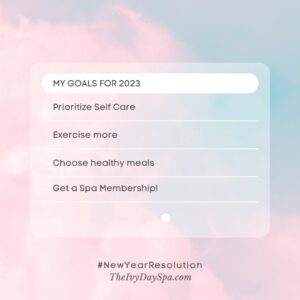Successful New Year’s Resolutions
Are you thinking about New Year Resolutions? We are here to support you in your wellness journey.
The most popular resolutions are about self improvement and taking better care of oneself. The key to successful resolutions is setting goals that come from positive desires versus negativity or guilt. For example, exercising and eating healthy are great resolutions, but can fail when steered by negative body image, insecurity or not fitting in with societal norms. Success is more likely to be achieved when the resolution is framed with positive reasons for improving health and wellness, such as more energy, better sleep, and reduced stress. These are positive results that are quicker to achieve, and are based on the goal setters making their value of self central. And once you have a taste of that success, it is easier to maintain the motivation to keep going.
“Wanting to change or improve an aspect of your life because that’s what you really want for yourself is an example of intrinsic motivation. Intrinsic motivation is a good thing to have because you know that what you are working to accomplish is something that will give you joy. Pursuing something out of fear, shame, or the intention of impressing others is not nearly as sustainable as pursuing something you know will truly enrich your life.
When setting resolutions, ask yourself if you’re doing it for you or for someone else. If you’re doing it for you, you set yourself up for success.”
 Other tips for success include:
Other tips for success include:
- Book a date with yourself once a week. Me Time! Take dedicated time to reflect on the process and celebrate your progress.
- Get a massage. Letting someone work the knots and tension out of your muscles for 30 minutes or an hour will actually help you be a better friend, worker, and person.
- Take more naps. When you pause your day with a nap, you will be more energetic and creative. Taking a break midday can increase your alertness, boost your performance, and help reduce on-the-job mistakes. Research has shown a short nap can help offset the high heart rate, raised blood pressure, and spiked blood sugar that come with a poor night’s sleep.
- Reduce your screen time. If you are like me, your screen time has sneakily increased… Looking at devices whenever I have free moments, scrolling while I wait. I will strive to be more cognizant of this habit and begin to replace with mindful observation of my surroundings, and think about other ways these minutes or hours may be used.
Sources: St. Lukes Health
